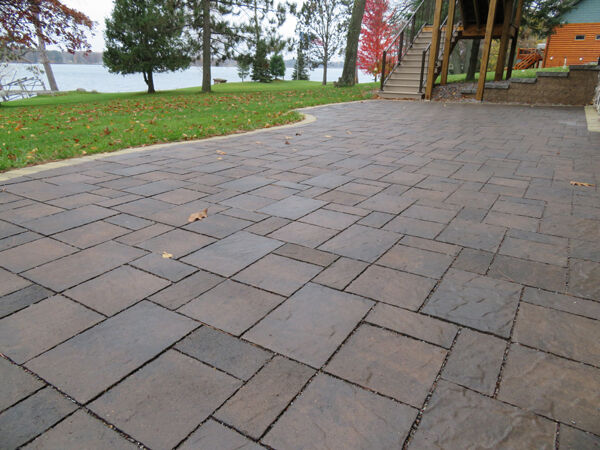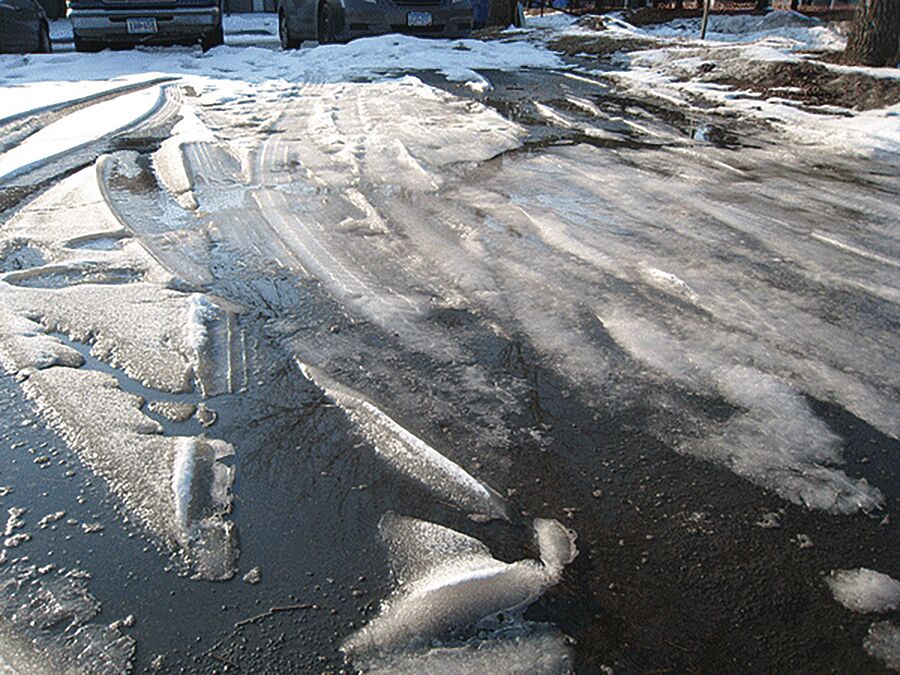Permeable pavers are a green solution

When sustainability and environmentally sensitive designs are an issue, Willow Creek's permeable pavers can be used to dramatically reduce runoff from stormwater and snowmelt.
Willow Creek's Select Series™ pavers are ideal for both standard and permeable installations. Willow Creek's Select Series™ includes Slatestone™, Slatestone Grande™, Dekrastone™ and Eurostone™ paving stones. The Select Series incorporates Willow Creek Infusion™ technology, which provides vibrant color, enhanced color longevity, heightened durability and additional stain-resistant properties. Select Series permeable pavers have been tested by an independent, certified laboratory to meet or exceed permeability standards (ASTM C1781).
Permeable paving stones reduce runoff into storm sewers and allow rain to infiltrate into the soil. Many municipalities have impervious surface limits, and permeable pavers offer a solution to adding paved surfaces without exceeding those limits.
To learn more, you can download this technical brief on permeable paving authored by David R. Smith, Interlocking Concrete Pavement Institute (ICPI), and produced by the U.S. DOT Federal Highway Administration (FHWA-HIF-19-021 April 2019). In addition, Dr. Smith authored an article summarizing ASCE Permeable Paver Standards for Stormwater Magazine.
Contact a Willow Creek Paving Stones' distributor for more information.
Stormwater & Permeable Paver Advantages
Stormwater that flows across fields, yards and paved surfaces carries pesticides, vehicle fluids, fertilizers and other pollutants. These pollutants then become concentrated in lakes and waterways when discharged from storm sewers. Fortunately, awareness of the problem is growing, and mitigating technologies have become available.
A convenient calculator to help you determine the amount of joint fill material you will need for your permeable installation is HERE.
Permeable pavers (or permeable interlocking concrete pavements PICP) are among the tools available to reduce stormwater runoff and improve water quality. Because they allow rainwater and snowmelt to infiltrate onsite, through the paved surface and into the subsoil, PICP systems help protect aquatic ecosystems, conserve water resources and mitigate flooding, while supporting vehicle and pedestrian traffic. Willow Creek Select Series permeable pavers provide an attractive, high-performance PICP stormwater management option suitable for residential, commercial and public works applications.
Permeable pavers offer several environmental benefits
- They help keep contaminants such as fertilizers, pesticides, vehicle fluids, and pet waste out of storm sewers. Once in the storm sewer, these materials end up in the waterways into which the sewers empty.
- They help manage water volume. The additional water that storm sewers contribute to waterways can accelerate shoreline erosion.
- They help manage water temperature. Runoff from an asphalt parking lot absorbs heat from the asphalt and warms the waterway into which it empties. This temperature increase, called thermal pollution, can affect some aquatic life.
- They help replenish groundwater and allow soil bacteria to break down potential pollutants naturally.
Ecological Benefits
- Reduce pollutant runoff into waterways
- Reduce thermal pollution of waterways
- Reduce "heat island" effect of paved surfaces
- Recharge groundwater
Economic Benefits
- Gain usable space on properties
- Reduce need for retention ponds
- Reduce costs of stormwater drainage
- Earn LEED credits
Performance Benefits
- Eliminates puddles on pavement
- Eliminates ice patches by draining snow melt
- Low maintenance
- Durable beauty
Permeable pavers vs. other permeable pavements
Permeable pavement includes pervious concrete, porous asphalt and permeable pavers. Permeable pavers (PICP) are superior to other pervious surfaces because
- PICP relies on solid, high-strength concrete units to support traffic, surrounded by small, highly pervious stone-filled joints to receive stormwater.
- Stone-filled joints in PICP contribute to interlocking permanence and also to the spreading of wheel loads for long-term durability.
- Hydrogeological performance of PICPs is superior because of the high surface infiltration rates in the PICP openings, well above practically all rainfall intensities.
- PICP units are manufactured in a facility and delivered to the project site. Installation is not subject to time or temperature limitations. Pervious concrete and porous asphalt are subject to weather as the materials are formed on the job site and, as a result, are temperature constrained and subject to site control for successful installation.
- PICP units have higher performance, including testing for freeze-thaw performance and compressive strength, unlike pervious concrete and porous asphalt. PICP units have a minimum strength of 8,000 psi, while pervious concrete has an average strength of 2,500 to 3,000 psi.
- PICP requires no curing time, while traffic must be kept off of porous asphalt for 24 hours and off of pervious concrete for 7 days.
- PICP offers more heat reflection than asphalt and other surfaces, reducing thermal pollution.
Adapted from the Interlocking Concrete Paving Institute (ICPI) "Interlocking Concrete Pavement, A Comparison Guide to Porous Asphalt and Pervious Concrete."
Winter Weather Advantage
Melting snow drains immediately through permeable pavers, eliminating the risk of re-freeze.

Impervious surfaces hold standing water and slush, creating a safety hazard when water re-freezes.

LEED Credits
From the U. S. Green Building Council (USGBC) website:
“LEED, or Leadership in Energy and Environmental Design, is the most widely used green building rating system in the world. Available for virtually all building, community and home project types, LEED provides a framework to create healthy, highly efficient and cost-saving green buildings. LEED certification is a globally recognized symbol of sustainability achievement.”
Willow Creek paving stones, including Willow Creek permeable pavers, might contribute to qualifying your project for certification in various LEED categories. The first step toward LEED certification is to register your project. Registration during the early phases of the project will ensure maximum potential for certification.
USGBC guides that will help you through the LEED certification process for various categories of construction are available online HERE.
For more information on the LEED program, contact the U.S. Green Building Council.
Accessories
The PermEdge edge restraint system for permeable pavers accommodates straight and curved applications. Other installation tools can be found here.
More Information
For more information, download:
- Permeable Pavers Information Sheet
- Permeable Paver Technical Guide
- Permeable Paver FAQs
- Permeable Paver Glossary
- Permeable Paver Maintenance Guide
Read an article on Willow Creek Permeable Pavers appeared in Hardscape magazine here.
ASCE/ICPI
The American Society of Civil Engineers (ASCE) Transportation and Development Institute and the Interlocking Concrete Pavement Institute (ICPI) have issued ASCE/ANSI 68-18 on Permeable Interlocking Concrete Pavement (PICP).
Tech Brief: Permeable Interlocking Concrete Pavement provides an extensive overview of PICP. (Author: David Smith, Interlocking Concrete Pavement Institute [ICPI], and U.S. DOT Federal Highway Administration No. FHWA-HIF-19-021 April 2019.)
An introduction to Permeable Interlocking Concrete Pavement is here. (Author: Interlocking Concrete Pavement Institute [ICPI] and U.S. DOT Federal Highway Administration No. FHWA-HIF-15-006 2015.)